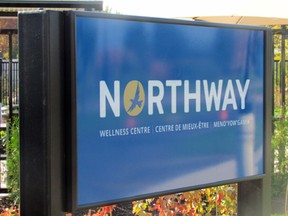‘Evident need’: Concurrent Disorders Day Treatment continues despite no new funding
Sault Area Hospital including $750K price tag in operating plan; still lobbying province for support

Article content
Sault Area Hospital has opted to continue offering the Concurrent Disorders Day Treatment program “given our community’s evident need.”
This is despite no new funding from the province to extend the program, geared to provide care close to home for those with moderate to severe substance abuse and co-existing mental health issues.
The hospital has opted to include A New Day Concurrent Disorders Intensive Day Treatment Program in its fiscal 2024/2025 operating plan. The annual operating budget for the program is $750,000, SAH manager of communications Brandy Sharp Young told The Sault Star Thursday.
“We continue to advocate to secure base funding for this service, recognizing its critical role in supporting individuals with concurrent disorders within our community,” Sharp Young said.
Early in the new year, Sault Area Hospital received one-time program funding of $750,000 for the fiscal year 2023-2024. Such support was slated to allow SAH’s mental health and addictions program to provide treatment for 60 to 100 individuals. This money, announced in January, had to be used by March 31 and, to continue the program beyond that, SAH said earlier it was lobbying Ontario Health North for more dollars for the fiscal year 2024-2025.
The decision to continue offering the program, delivered at Northway Wellness Centre, the $21-million facility officially opened last September on Old Garden River Road, came “after considering the evident need for the program in our community,” the hospital said.
SAH did not say how long it would continue to shoulder the program should provincial support not be forthcoming.
Concurrent Disorders Day Treatment Program is available to those both in hospital and the community who have substance use or gambling, gaming, or technology use issues and have a co-existing mental illness. Care includes confidential short-term counselling to bridge the gap between mental health and addictions treatment services, group support, assessment and treatment referrals, with the overall goal of enhancing collaborative mental health services.
January funding allowed the first session, which the hospital said in a social media post saw “remarkable outcomes,” with 80 per cent of attendees receiving certificates of achievement for completing the program, as well as “outcomes that extended beyond completion certificates,” such as securing “appropriate” housing, returning to school, gaining employment and family reunification.
In parallel, SAH also conducted groups for Withdrawal Management/Safe Beds, which saw “significant engagement.” A total of 221 group sessions, 564 face-to-face visits and 151 additional phone support/virtual care visits, were conducted.
The Concurrent Disorders Intensive Day Treatment program, first offered in November 2020 to provide assistance to low-barrier substance users and dependency treatment and allowing participants to avoid time away from work, was paused in June 2022 due to lack of funding.
The service, based on Ottawa’s Royal Hospital gold standard program and crafted to serve Sault Ste. Marie, is a blend of psychotherapy, art therapy, recreation, music and daily living activities, such as food preparation, safe storage and other practical needs.
Originally a pilot but not funded on a permanent basis, the program reportedly showed good outcomes on issues that continue to plague Sault Ste. Marie.
Data show the city has a higher-than-average overdose and fatality rate from the opioid addictions epidemic. Emergency room visits and deaths related to opioid use and abuse are significantly higher in the Sault than that of provincial averages.
In fact, figures released in February by Ontario’s Chief Coroner show Sault Ste. Marie has higher than provincial average rates for opioid-related calls. Third-quarter results for 2023 show Sault Ste. Marie has twice the provincial rate for opioid-related emergency department visits, three times the provincial rate for hospitalizations and is slightly above (0.6 times) the provincial rate for deaths.
Postmedia is committed to maintaining a lively but civil forum for discussion. Please keep comments relevant and respectful. Comments may take up to an hour to appear on the site. You will receive an email if there is a reply to your comment, an update to a thread you follow or if a user you follow comments. Visit our Community Guidelines for more information.